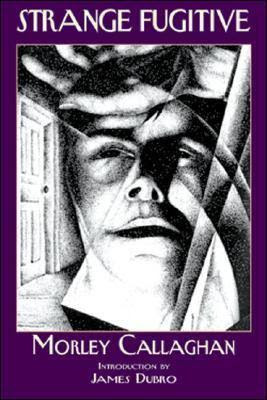I seem to be reading a lot of Camus-esque novels lately. Frankly, it isn't really my cup of tea. I don't mind an exploration of themes of social isolation and nihilism or whatever, but an unsympathetic protagonist really grates on me. I am full of empathy to the point that it greatly influences how I consume media, and I just cannot engage well in a book that doesn't give me someone to empathize with.
I think Trevor Cole did this successfully with Norman Bray - presenting an unsympathetic protagonist while still managing to engage the reader in caring about the outcome - by firstly using supporting characters that were well-drawn and sympathetic, and secondly by making the novel at least partly comic. I get a bit weary of the plodding seriousness of these "stranger" books. Guilty was at least playful in a sort of grotesque way. Strange Fugitive is not.
I wanted to lay all that out initially so you know that I have a personal objection to this type of novel that is not really indicative of how good it is or how much you might enjoy it. I guess that's true of any review though.
Strange Fugitive follows a few months in the life of a man named Harry Trotter who, after being laid off from his job at a lumber yard for fighting, teams up with a friend, Jimmie, to start a thriving bootlegging business (it's set in the 1920s). He leaves his wife and seems to spend most of his time wondering if he should go back to her, or thinking about his dead mother - and not in a nice, aww he really cared about his mom sort of way, more like a no woman could ever live up to my mummy kind of thing. Harry and Jimmie are ruthless and dishonest in their business, stealing booze shipments from other bootleggers and undercutting them as well.
Harry is a super unlikeable protagonist. He is mopey and mean. He treats women like crap. He is never content with his lot and always wants to control more, to be in charge of the whole city. And he kills a guy, and doesn't give a shit. He is not a good person and I hoped throughout the book that he would die and we could follow some other character instead.
This book might interest you if you are into learning about Toronto in the 1920s, particularly the nitty-gritty of the bootlegging scene at the time; I guess Callaghan was a newspaper reporter and was getting the inside scoop on how it all worked, so it's probably pretty accurate - and I did find the historical aspect of the novel interesting. I liked how much everyone travelled on the streetcars (for some reason I always love it when streetcars turn up in Toronto novels). Toronto enthusiasts and history buffs should probably check this out.
For the rest of us, I can't really recommend it. It's well written and the premise is interesting, but for a short novel it's a hard slog because trying to sympathize with an awful character is exhausting. Life's too short.
Two CN Towers out of five.


No comments:
Post a Comment